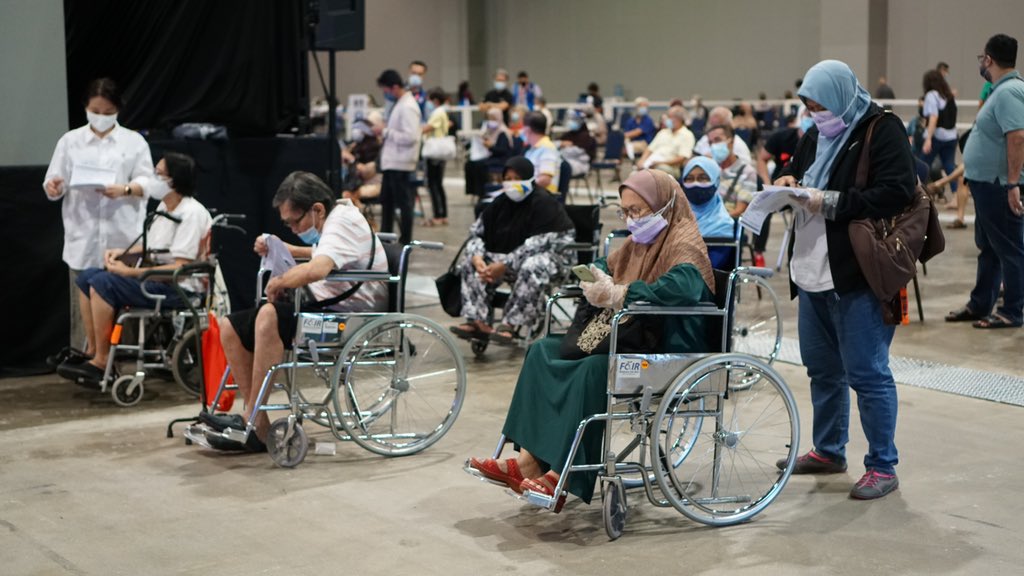Harris Zainul was quoted on Arab News on 06 June 2021
By Ushar Daniele
Accuse authorities of ‘incompetence’ after public blamed for flouting strict lockdown rules, leading to a surge in cases
KUALA LUMPUR: Malaysians came to each other’s defense on Saturday, days after being blamed for a rapid rise in COVID-19 infections across the country, with several slamming the government for its “incompetence” in handling the health crisis a year into the pandemic.
Despite successfully avoiding the worst of the pandemic last year, Malaysia witnessed a dangerous new outbreak and surge in cases in early April, resulting in Prime Minister Muhyiddin Yassin announcing a strict two-week lockdown from June 1.
Authorities imposed restrictions in all social and commercial areas, with only essential services and economic sectors allowed to operate, as listed by the national security council.
However, despite concerted attempts to flatten the infection curve, most citizens were accused of crossing state borders while several streets of the capital city, Kuala Lumpur, remained abuzz with activity.
It generated much debate and bitterness online, with the hashtag RakyatGagal (#failed citizens) trending on social media and the health ministry’s director-general Noor Hisham Abdullah asking Malaysians on Facebook “where they were heading to?”
Citizens, however, said that it was “unfair and dangerous” to accuse all for the mistakes of a few.
“What the hashtag seeks to achieve, essentially, is to paint the entire population as failing to adhere to SOPs, (which) is completely unfair and disingenuous,” Harris Zainul, 29, an analyst at the Institute of Strategic and International Studies (ISIS) in Malaysia, told Arab News.
“It goes without saying that although there are some pockets of society that remain irresponsible by flouting restrictions, it does not represent the rest of the population,” he said.
PM Muhyiddin’s government has also faced intense criticism over its “double standards” in enforcing the SOP’s — many businesses, including factories, are allowed to operate at 60 percent capacity — and is reeling from grievances, including difficulties faced in booking vaccine appointments.
“A year into the pandemic, this should be seen as an issue of governance,” Aaron Denison Deivasagayam, 29, a member of the Demokrat Kebangsaan youth movement, told Arab News.
He added that people didn’t “fail the government” during the first lockdown in March 2020, “which was a good start.”
“However, the main issues which began contributing to the (surge in) cases were the Sabah state elections and a blatant disregard of the rules by those in power. The mixed messages about quarantine for those who were returning from Sabah and the ministers that returned and didn’t quarantine opened a huge can of worms,” Aaron said.

Pandemic fatigue, he explained, was also a “huge” contributing factor.
“Hence, bad governance led to the increase in cases and with good governance people would not have had pandemic fatigue and, therefore, trusted the authorities,” Aaron said.
Meanwhile, experts fear that if the current infection rate persists, the lockdown could be extended beyond the 14-day limit initially set by the government.
Economic Officer Syed Mohamed Arif told Arab News that increasing the number of vaccines administered, however, could “stabilize the rate of infections.”
Malaysia has already begun its COVID-19 inoculation drive, even though critics say the rollout has been slow. Only 3.4 million people out of a population of 32.7 million have received at least one dose of a vaccine.
“There is room for better coordination for the vaccination process, prioritizing people that need to go to work every day compared to the people that can work from home,” Syed, 29, said.
Asked whether the Malaysian economy could remain resilient against a lockdown extension that would see only essential businesses operating, Syed explained that Malaysia has the means for “monetary cushions” as it is a developing country.
“However, I believe it is not fair to blame it on the rakyat (general public). We can survive. However, a proper mechanism to ensure there is food on the table for the lower and middle-income groups (is needed),” Syed told Arab News.
Former health minister and chairman of Selangor’s COVID-19 taskforce, Dr. Dzulkefly Ahmad, agreed, adding: “Failures of the people reflect on the failures of the government and leaders of the day.”
“If anything, the buck stops at the political leaders, and I cannot understand how we can directly blame the people whose unfortunate accusation affects the nation’s morale tremendously,” Dzulkefly told Arab News.
He criticized the government for painting everyone with the same brush.
“Accusing all people by generalizing many for breaching COVID-19 Standard Operating Procedures shouldn’t have happened,” he said, adding that authorities should have conducted compliance checks and “made conclusions based on evidence and data.”
Dzulkefly explained that “many factors” could have led to non-compliance of SOPs “as if they were only complying out of fears of being punished.”
“There must be a self-drive for people to regulate themselves for the betterment of the nation,” he said, before flagging another issue — the frequent change of regulations “that have left many people confused.”
“The challenge is to educate and not simply to punish,” Dzulkefly said.
PM Muhyiddin’s government has faced a litmus test since last year, with experts warning of “bigger challenges ahead.”
Politically, too, Muhyiddin’s position remains shaky as party allies have called him out over his failure to manage the health crisis.
In January, a state of emergency was declared in Malaysia after its monarch, Sultan Abdullah Ahmad Shah, agreed to the government’s request for this.
According to the palace, the approval of the emergency measures came as a “proactive move to control and flatten” the daily COVID-19 positive cases that have continuously breached four figures since December.
However, that initiative, too, proved to be a failure, with more than 610,574 cases and 3,186 deaths registered to date.
This article was first appeared on Arab News on 06 June 2021.





